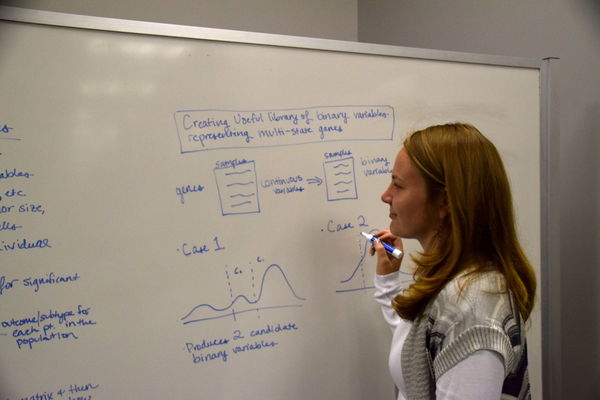

It is hard for cancer research to advance without using quantitative methods to learn more about certain diseases. Statistics are especially important not only in better understanding cancer but the treatments that are often offered. This is an area in which Stephanie Wachs, a current senior at Notre Dame, has a lot to offer. Stephanie is working with Steve Buechler, professor of applied and computational mathematics and statistics, who focuses on using biostatistics, bioinformatics, and computational biology to analyze the genetics of certain diseases. Prof. Buechler is currently focused on developing an affordable test to predict the chance of relapse for breast cancer patients.
Working with Prof. Buechler, Stephanie is using her interests and background in statistics and medicine to gain more experience in the cancer field. She is majoring in applied and computational mathematics and statistics, and is also on Notre Dame’s pre-medical track. Stephanie’s goal is to become a doctor, and she is currently interviewing with medical schools. This background and interest enables her to understand the methods used for her research.
For her specific project, Stephanie is using statistical computing software, specifically R, to replicate part of a study. The MILE Study used biological methods to correctly identify subclasses of leukemia through an analysis of patients’ genetic codes. Stephanie will be recreating part of this study, using mathematical methods instead of biological methods. “The goal is to devise a way to accurately predict a patient’s leukemia subtype using math instead of biological methods. This would ultimately improve leukemia patients’ diagnosis and treatment processes,” Stephanie explains.
Stephanie’s research is important in finding a way to accurately subtype leukemia. “I hope to learn more about these methods and processes, especially in the context of biology and medicine. I want to learn firsthand how statistics can improve healthcare and how we diagnose and treat patients” Stephanie says. She hopes to ultimately carry her research over to her work as a physician, and use her math expertise to improve the care she provides to her patients.
Originally published by Jenna Bilinski at harpercancer.nd.edu on February 11, 2015.